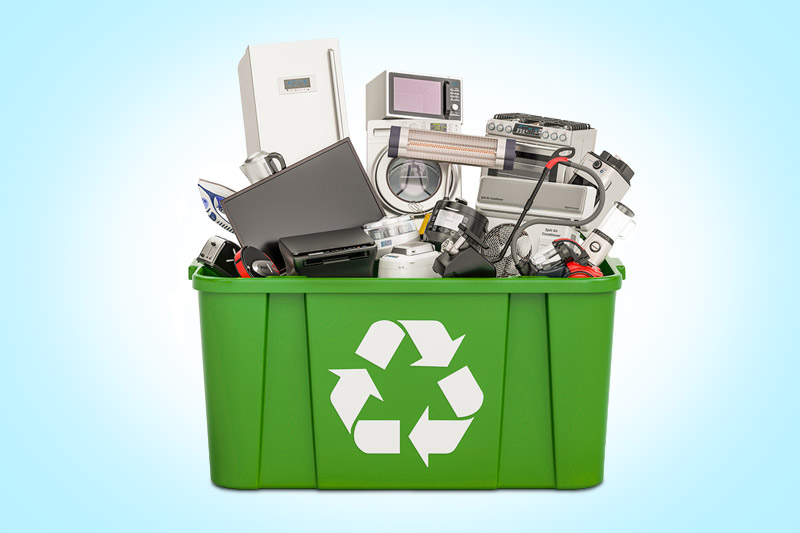Elevate Your E-Waste Administration With R2 Qualification: an Extensive Introduction
One key technique to raise e-waste monitoring methods is by obtaining R2 accreditation. By exploring the advantages and procedures linked with R2 certification, a deeper understanding of how it can revolutionize e-waste administration approaches arises, dropping light on a path towards sustainability and moral disposal practices.
Relevance of E-Waste Monitoring

When e-waste is not managed correctly, these toxic materials can leak right into the environment, creating injury to wildlife and possibly getting in the food chain, positioning threats to human health and wellness. The inappropriate disposal of e-waste adds to contamination and greenhouse gas emissions, worsening environment modification and environmental deterioration.

Benefits of R2 Certification

Firstly, R2 qualification improves reputation by showcasing a company's commitment to lasting techniques. It ensures consumers, partners, and stakeholders that the firm sticks to strict criteria for e-waste monitoring - r2 certification. This integrity can bring about raised depend on and boosted partnerships with clients that prioritize ecological duty
Second of all, R2 qualification assists alleviate dangers associated with incorrect e-waste disposal. By adhering to the strict guidelines stated by the qualification, companies can minimize the possibility of data breaches, ecological contamination, and lawful effects. This aggressive approach safeguards the company's credibility and reduces prospective obligations.
Last but not least, R2 qualification shows a dedication to ecological stewardship - r2 certification. By sensibly taking care of digital waste via certified processes, organizations add to the preservation of sources, decrease of air pollution, and promo of a round economic situation. This dedication not just profits the setting however likewise lines up with progressing consumer expectations for sustainable business practices
R2 Certification Process Overview
Having actually developed the advantages of R2 qualification in promoting reputation, threat reduction, and ecological stewardship, it is necessary to now describe the comprehensive procedure included in acquiring this certification. The R2 accreditation process begins with a comprehensive review of the company's functional plans and procedures to ensure compliance with the R2 standard. This initial assessment is crucial in identifying any voids that require to be attended to before proceeding further.
Once the company's methods line up with the R2 common demands, an independent third-party auditor carries out an on-site audit to examine the application and performance of these techniques. This have a peek here audit consists of a thorough testimonial of documents, meetings with team, and physical assessments of facilities to verify conformity.
Complying with a successful audit, the organization receives a qualification decision based upon the auditor's findings. If accepted, the company is given R2 qualification, showing its commitment to liable e-waste administration. It is necessary to keep in mind that maintaining R2 qualification requires continuous compliance with the criterion's demands and routine audits to make sure ongoing adherence to finest techniques in e-waste recycling and disposal.
Key Requirements for R2 Conformity
A necessary facet of achieving R2 conformity is making certain that all electronic waste (e-waste) handling centers meet rigorous environmental and safety and security standards. To abide by R2 demands, companies need to follow key criteria that concentrate on accountable e-waste monitoring techniques. These standards include carrying out a recorded environmental, health and wellness, and safety and security monitoring system, ensuring the secure handling of data-containing devices, and conducting complete downstream due persistance to why not check here track the last location of e-waste products.
In addition, R2 conformity requires the appropriate testing, refurbishment, and recycling of electronic equipment to extend its useful life and decrease ecological influence. Facilities looking for R2 accreditation should likewise prioritize employee health and wellness by supplying needed training, personal protective tools, and a secure working environment. Additionally, keeping in-depth records of e-waste processing tasks and consistently undertaking audits by recognized certifying bodies are vital parts of demonstrating ongoing conformity with R2 requirements.
Impacts of Lasting E-Waste Practices
The application of sustainable e-waste techniques according to R2 conformity not just ensures ecological and security standards are fulfilled however additionally substantially impacts the total lifecycle of electronic items. By adhering to R2 criteria, electronic waste monitoring processes come to be much more efficient, minimizing the environmental footprint of digital products. Lasting e-waste practices promote the proper disposal of digital components, making certain that dangerous products are handled sensibly and do not end up polluting the setting.
Furthermore, welcoming sustainable e-waste techniques promotes the round economic content situation by helping with the recuperation and reuse of valuable materials from digital items. This not only saves priceless sources but likewise lowers the need for resources removal, minimizing the environmental effect of electronic manufacturing. In addition, sustainable e-waste methods can add to work production in the recycling and refurbishment industries, promoting financial development while advertising environmental responsibility. Generally, the fostering of lasting e-waste techniques under R2 certification works as a vital action in the direction of attaining a more environmentally sustainable electronics industry.
Conclusion
In verdict, executing correct e-waste monitoring practices is important for environmental sustainability and source preservation. R2 accreditation plays a crucial function in ensuring responsible handling and disposal of electronic waste. By sticking to the rigid standards set forth by R2 requirements, organizations can not just decrease their ecological effect however also add to a more sustainable future for generations to come.
One key method to elevate e-waste administration techniques is by attaining R2 qualification. By discovering the advantages and procedures associated with R2 qualification, a much deeper understanding of exactly how it can change e-waste management strategies emerges, losing light on a path towards sustainability and honest disposal techniques.
The R2 accreditation process starts with a detailed evaluation of the company's operational policies and treatments to ensure compliance with the R2 requirement. If approved, the organization is approved R2 accreditation, demonstrating its dedication to liable e-waste management. In general, the fostering of lasting e-waste methods under R2 accreditation offers as an important step in the direction of attaining a much more environmentally sustainable electronic devices sector.